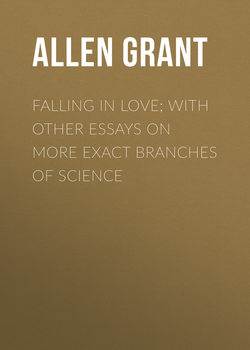Falling in Love; With Other Essays on More Exact Branches of Science

Реклама. ООО «ЛитРес», ИНН: 7719571260.
Оглавление
Allen Grant. Falling in Love; With Other Essays on More Exact Branches of Science
FALLING IN LOVE
RIGHT AND LEFT
EVOLUTION
STRICTLY INCOG
SEVEN-YEAR SLEEPERS
A FOSSIL CONTINENT
A VERY OLD MASTER
BRITISH AND FOREIGN
THUNDERBOLTS
HONEY-DEW
THE MILK IN THE COCO-NUT
FOOD AND FEEDING
DE BANANA
GO TO THE ANT
BIG ANIMALS
FOSSIL FOOD
OGBURY BARROWS
FISH OUT OF WATER
THE FIRST POTTER
THE RECIPE FOR GENIUS
DESERT SANDS
Отрывок из книги
An ancient and famous human institution is in pressing danger. Sir George Campbell has set his face against the time-honoured practice of Falling in Love. Parents innumerable, it is true, have set their faces against it already from immemorial antiquity; but then they only attacked the particular instance, without venturing to impugn the institution itself on general principles. An old Indian administrator, however, goes to work in all things on a different pattern. He would always like to regulate human life generally as a department of the India Office; and so Sir George Campbell would fain have husbands and wives selected for one another (perhaps on Dr. Johnson's principle, by the Lord Chancellor) with a view to the future development of the race, in the process which he not very felicitously or elegantly describes as 'man-breeding.' 'Probably,' he says, as reported in Nature, 'we have enough physiological knowledge to effect a vast improvement in the pairing of individuals of the same or allied races if we could only apply that knowledge to make fitting marriages, instead of giving way to foolish ideas about love and the tastes of young people, whom we can hardly trust to choose their own bonnets, much less to choose in a graver matter in which they are most likely to be influenced by frivolous prejudices.' He wants us, in other words, to discard the deep-seated inner physiological promptings of inherited instinct, and to substitute for them some calm and dispassionate but artificial selection of a fitting partner as the father or mother of future generations.
Now this is of course a serious subject, and it ought to be treated seriously and reverently. But, it seems to me, Sir George Campbell's conclusion is exactly the opposite one from the conclusion now being forced upon men of science by a study of the biological and psychological elements in this very complex problem of heredity. So far from considering love as a 'foolish idea,' opposed to the best interests of the race, I believe most competent physiologists and psychologists, especially those of the modern evolutionary school, would regard it rather as an essentially beneficent and conservative instinct developed and maintained in us by natural causes, for the very purpose of insuring just those precise advantages and improvements which Sir George Campbell thinks he could himself effect by a conscious and deliberate process of selection. More than that, I believe, for my own part (and I feel sure most evolutionists would cordially agree with me), that this beneficent inherited instinct of Falling in Love effects the object it has in view far more admirably, subtly, and satisfactorily, on the average of instances, than any clumsy human selective substitute could possibly effect it.
.....
Look at the analogy of domestic animals. That is the analogy to which breeding reformers always point with special pride: but what does it really teach us? That you can't improve the efficiency of animals in any one point to any high degree, without upsetting the general balance of their constitution. The race-horse can run a mile on a particular day at a particular place, bar accidents, with wonderful speed: but that is about all he is good for. His health as a whole is so surprisingly feeble that he has to be treated with as much care as a delicate exotic. 'In regard to animals and plants,' says Sir George Campbell, 'we have very largely mastered the principles of heredity and culture, and the modes by which good qualities may be maximised, bad qualities minimised.' True, so far as concerns a few points prized by ourselves for our own purposes. But in doing this, we have so lowered the general constitutional vigour of the plants or animals that our vines fall an easy prey to oidium and phylloxera, our potatoes to the potato disease and the Colorado beetle; our sheep are stupid, our rabbits idiotic, our domestic breeds generally threatened with dangers to life and limb unknown to their wiry ancestors in the wild state. And when one comes to deal with the infinitely more complex individuality of man, what hope would there be of our improving the breed by deliberate selection? If we developed the intellect, we would probably stunt the physique or the moral nature; if we aimed at a general culture of all faculties alike, we would probably end by a Chinese uniformity of mediocre dead level.
The balance of organs and faculties in a race is a very delicate organic equilibrium. How delicate we now know from thousands of examples, from the correlations of seemingly unlike parts, from the wide-spread effects of small conditions, from the utter dying out of races like the Tasmanians or the Paraguay Indians under circumstances different from those with which their ancestors were familiar. What folly to interfere with a marvellous instinct which now preserves this balance intact, in favour of an untried artificial system which would probably wreck it as helplessly as the modern system of higher education for women is wrecking the maternal powers of the best class in our English community!
.....